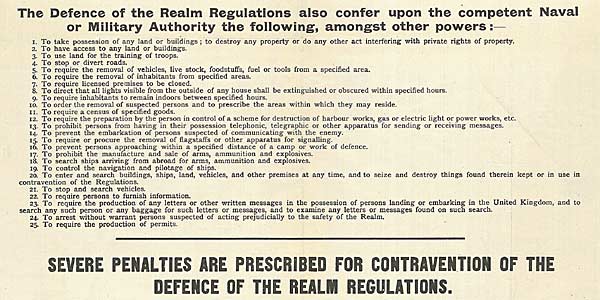Defence of the Realm Act of 1914
The 1914 Defence of the Realm Act (DORA) saw the British government massively increase its regulatory powers on the home front during World War One. It was drafted to prevent information traveling from Britain to the enemy, but also to censor anti-war propaganda and redirect economic resources towards the war effort.

The Act was expanded and developed as the war went on. It listed all the prohibited activities, as well as the extra powers of government. During World War One DORA was redrafted six times. The first version of the Defence of the Realm Act was introduced on August 1914. It became an offence to:
- talk about naval or military matters in public places
- spread rumours about military matters
- buy binoculars
- ring church bells
- trespass on railway lines or bridges
- melt down gold or silver
- use invisible ink when writing abroad
- buy brandy or whisky in a railway refreshment room
- light bonfires or fireworks
- give bread to horses or chickens
It gave government the power to:
- take over any factory or workshop
- try any civilian breaking these laws
- take over any land it wanted to
- censor newspapers
As the war continued and evolved, the government introduced more acts to DORA.
The government introduced British Summer Time to give more daylight for extra work; opening hours in pubs were cut and beer was watered down. These intrusions into everyday life led many to criticise the sweeping powers of the Defence of the Realm Act.
See also: Background to World War One
MLA Citation/Reference
"Defence of the Realm Act of 1914". HistoryLearning.com. 2024. Web.
